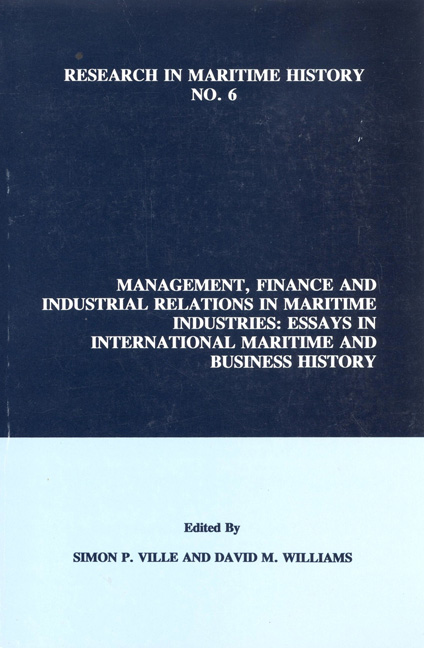 Management, Finance and Industrial Relations in Maritime Industries
Management, Finance and Industrial Relations in Maritime Industries Book contents
- Frontmatter
- Contents
- Contributors
- Introduction
- Contributors
- “Economic Theory, Information and Management in Shipbroking: Fearnley and Eger as a Case Study, 1869-1972”
- “The Early Nineteenth-Century Port of London: Management and Labour in Three Dock Companies, 1800-1825”
- “Owners and Masters: Management and Managerial Skills in the Finnish Ocean-Going Merchant Fleet, c. 1840-1880”
- “Management, Profitability and Finance in Twentieth-Century Spanish Merchant Shipping: The Compañía Maritima Del Nervion as a Case Study, 1899-1986”
- “Twentieth-Century Shipping Strategies: Broström and Transatlantic, Gothenburg's Leading Shipping Companies”
- “Contractors' Bounties or Due Consideration?: Evidence on the Commercial Nature of The Royal Mail Steam Packet Company's Mail Contracts, 1842-1905”
- “Patterns of Ownership and Finance in the Greek Deep-Sea Steamship Fleet, 1880-1914”
- “Financial Weakness and Industrial Conflict in Italian Shipbuilding Between the Two World Wars”
- “Responding to the Global Market in Boom and Recession: Japanese Shipping and Shipbuilding Industries, 1945- 1980
“Management, Profitability and Finance in Twentieth-Century Spanish Merchant Shipping: The Compañía Maritima Del Nervion as a Case Study, 1899-1986”
from Contributors
- Frontmatter
- Contents
- Contributors
- Introduction
- Contributors
- “Economic Theory, Information and Management in Shipbroking: Fearnley and Eger as a Case Study, 1869-1972”
- “The Early Nineteenth-Century Port of London: Management and Labour in Three Dock Companies, 1800-1825”
- “Owners and Masters: Management and Managerial Skills in the Finnish Ocean-Going Merchant Fleet, c. 1840-1880”
- “Management, Profitability and Finance in Twentieth-Century Spanish Merchant Shipping: The Compañía Maritima Del Nervion as a Case Study, 1899-1986”
- “Twentieth-Century Shipping Strategies: Broström and Transatlantic, Gothenburg's Leading Shipping Companies”
- “Contractors' Bounties or Due Consideration?: Evidence on the Commercial Nature of The Royal Mail Steam Packet Company's Mail Contracts, 1842-1905”
- “Patterns of Ownership and Finance in the Greek Deep-Sea Steamship Fleet, 1880-1914”
- “Financial Weakness and Industrial Conflict in Italian Shipbuilding Between the Two World Wars”
- “Responding to the Global Market in Boom and Recession: Japanese Shipping and Shipbuilding Industries, 1945- 1980
Summary
Introduction
In the last decade, the Spanish shipping industry has been severely depressed. According to Lloyd's Register of Shipping, the merchant fleet, which peaked in 1979 at 8,313,658 gross registered tons (grt), declined in the next decade to 3,961,941 grt, a drop of fifty-two percent. A feature of this decline, in the case of Bilbao, has been the dissolution of a number of shipping firms, many of them in business for about a century. The Naviera Aznar (founded in the 1890s) failed in 1982; the Marítima del Nervión (founded in 1907) collapsed in 1986, and the group Naviera Vascongada-Naviera Bilbaína (founded in 1900) came to an end in 1993. Hence, writing about the contemporary Spanish shipping industry is to write of decline and decay. This paper deals precisely with that, for its subject is a shipping firm that has only recently ceased operation, the Compañía Marítima del Nervión (CMN), which had occupied a remarkable position in the Spanish merchant fleet since its foundation at the beginning of the twentieth century.
In business history, above all in Britain, maritime topics have occupied positions of considerable significance. Although there were valuable studies of shipping firms before the 1950s, the end of that decade represents something of a watershed in maritime business history. In 1957, a year before the British journal Business History first appeared, Francis Hyde published his study of the Blue Funnel Line, which pioneered new approaches and set new standards in the field. Under Hyde's influence in the 1960s and 1970s a group of scholars at the University of Liverpool produced a series of major studies of British shipping firms.3 Doubtless influenced by the “entrepreneurial history” that A.H. Cole and others had undertaken at Harvard since the late 1940s, the Liverpool school was concerned with analysing business strategy. Its focus was on the entrepreneurial capacity of managers to cope with continuous change in markets, technology and other factors, and its effect on the performance and profitability of the firm.
In the 1980s, maritime business history experienced a remarkable growth, not only in Britain but also in other countries. Yet in Spain, literature about shipping companies is far from abundant and the majority of the studies that have appeared, while valuable, can be characterised as descriptive rather than analytic.
- Type
- Chapter
- Information
- Management, Finance and Industrial Relations in Maritime IndustriesEssays in International Maritime and Business History, pp. 67 - 90Publisher: Liverpool University PressPrint publication year: 1994


